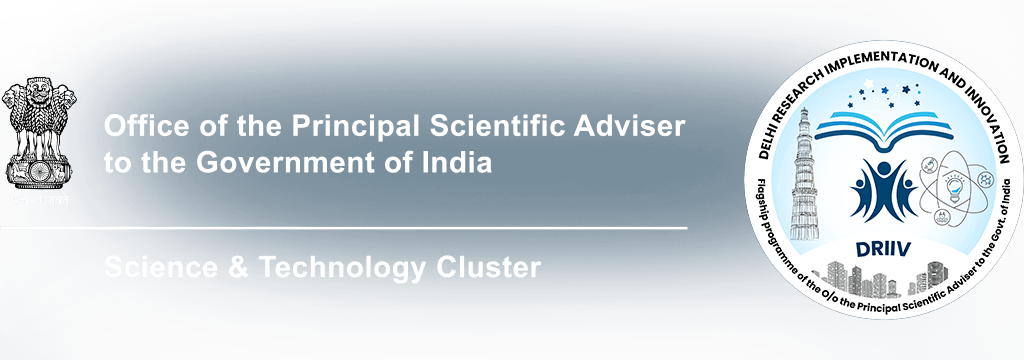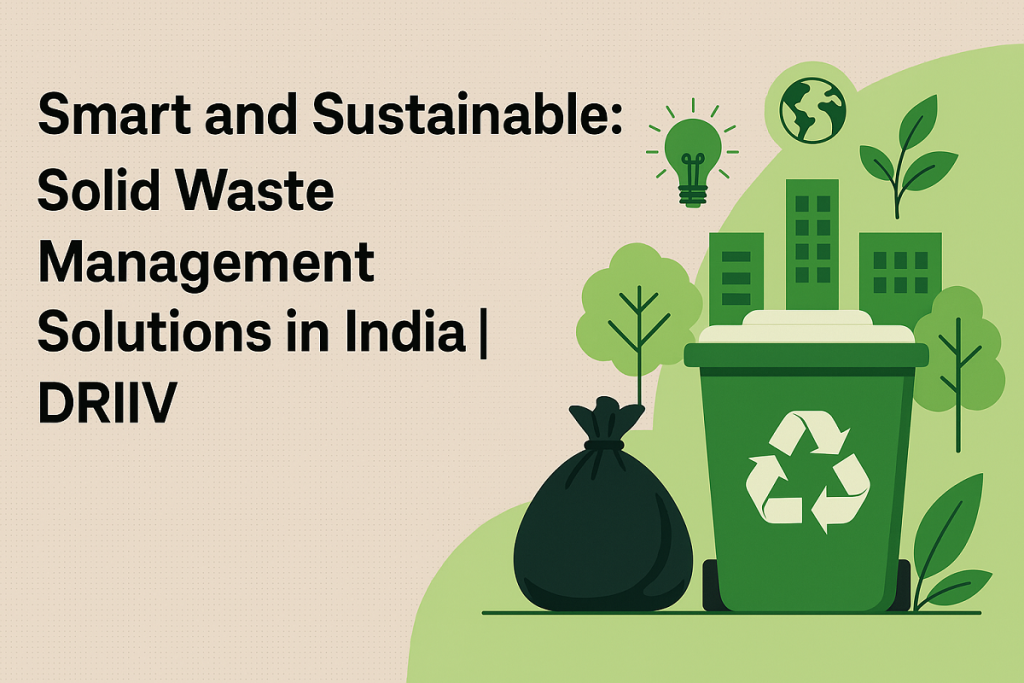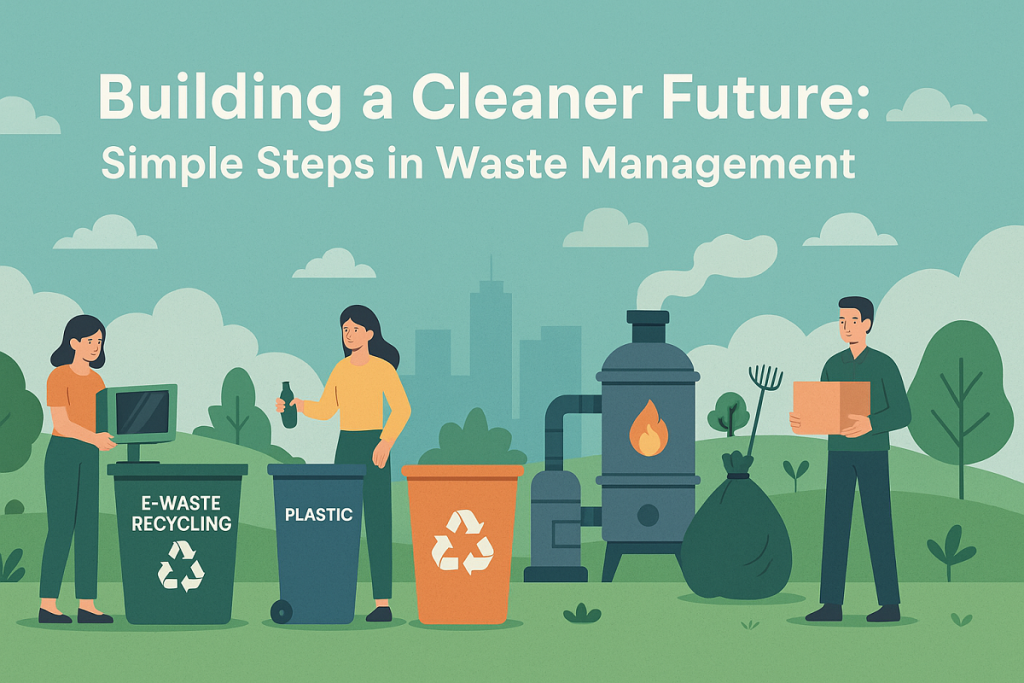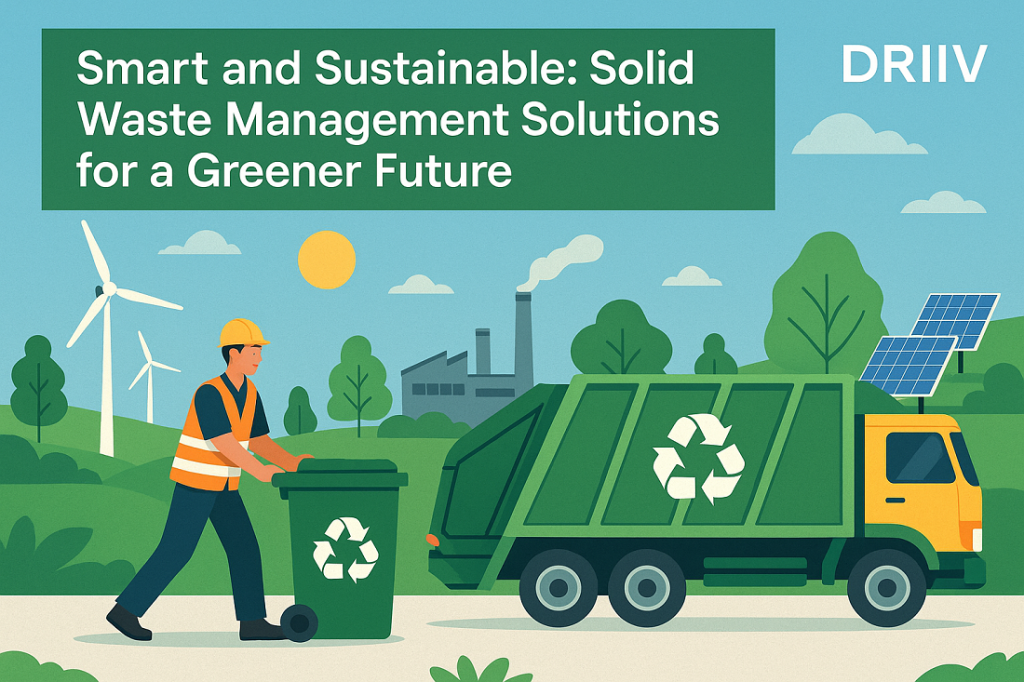Solid waste is one of the biggest challenges India faces today. Every day, cities and towns generate thousands of tonnes of waste. Without proper management, this waste leads to pollution, health hazards, and environmental degradation. At DRIIV, we believe in using science and innovation to create smart solutions for solid waste management. This blog explores the current scenario, major problems, and the best solid waste management solutions in India.
What is Solid Waste Management?
Solid waste management is the process of collecting, treating, and disposing of solid waste in a safe and efficient manner. This includes:
- Collection of household and industrial waste
- Segregation of biodegradable and non-biodegradable waste
- Recycling and composting
- Transportation and disposal in an eco-friendly way
The goal is to reduce the impact of waste on human health and the environment.
The Need for Solid Waste Management Solutions in India
India produces more than 160,000 tonnes of solid waste every day. Unfortunately, much of it ends up in open dumps, water bodies, or on roadsides. This causes:
- Air and water pollution
- Spread of diseases
- Soil contamination
- Loss of biodiversity
These issues highlight the urgent need for solid waste management solutions in India that are scalable, smart, and sustainable.
Read More: Building A Cleaner Future: Simple Steps In Waste Management
Solid Waste Management Problems and Solutions
Let’s understand the major solid waste management problems and solutions step by step:
1. Problem: Lack of Waste Segregation
Most households and institutions do not separate biodegradable and non-biodegradable waste.
Solution to Solid Waste Management:
Promote awareness campaigns and implement strict rules for waste segregation at source. Use color-coded bins and educate people on how to dispose of different types of waste.
2. Problem: Poor Collection Systems
Many areas, especially rural and slum regions, do not have regular garbage collection.
Solution: Invest in smart sensors and GPS-enabled waste collection vehicles. Municipalities can use real-time data to plan routes and ensure timely pickup.
3. Problem: Overflowing Landfills
Most waste is dumped into overflowing landfills, causing harmful gases like methane.
Solution: Adopt waste-to-energy technologies like bio-methanation and plasma pyrolysis. These methods convert waste into energy while reducing landfill pressure.
4. Problem: Limited Recycling Infrastructure
Only a small percentage of recyclable materials are processed.
Solution: Set up Material Recovery Facilities (MRFs) to improve recycling. Encourage local entrepreneurs to invest in recycling businesses with support from public-private partnerships.
5. Problem: Informal Waste Sector Exclusion
Ragpickers and informal workers play a key role but often lack support or recognition.
Solution: Integrate them into formal systems. Provide training, protective gear, and identity cards. Empower them as part of the official solid waste management workforce.
Smart Solutions for Solid Waste Management
Smart solutions use data, IoT, AI, and sustainable technology to improve the efficiency and impact of waste management. Here are some innovations:
1. IoT-Based Smart Bins
Bins with sensors can notify authorities when they are full. This avoids overflows and saves fuel by optimizing collection routes.
2. AI-Powered Waste Sorting
AI and machine learning can help sort waste at large facilities, improving the quality and speed of recycling.
3. Composting Units in Communities
Decentralized composting units in housing societies and schools reduce the need for large-scale transportation and landfills.
4. Waste-to-Energy Plants
Converting waste into electricity or biofuel provides energy while reducing pollution.
5. Mobile Apps for Reporting Waste
Apps like “Swachhata” allow citizens to report uncollected waste or illegal dumping, making municipalities more accountable.
Solid Waste Management Solutions in India: What’s Working?
India is seeing progress, especially under the Swachh Bharat Mission. Some cities and states have become role models:
Indore: Known for its decentralized waste collection and composting.
Pune: Recognized for integrating informal waste workers into formal systems.
Hyderabad: Successfully using waste-to-energy technologies.
DRIIV supports these initiatives by offering solid waste management solutions in India that combine science, policy, and innovation.
DRIIV’s Role in Solid Waste Management
At DRIIV, we focus on:
- Supporting technology startups in waste management
- Promoting R&D-based pilot programs
- Working with local governments to implement scalable solutions
- Creating public awareness campaigns
- Developing smart, data-driven tools for tracking waste
Our goal is to offer holistic, inclusive, and smart solutions that make Indian cities cleaner, greener, and more sustainable.
Benefits of Effective Solid Waste Management
- Cleaner neighborhoods
- Improved air and water quality
- Lower greenhouse gas emissions
- New job opportunities in recycling and technology
- Better public health and hygiene
- Enhanced circular economy
Call to Action
Whether you’re a policymaker, entrepreneur, or citizen, you have a role to play in creating smart solutions for solid waste management. DRIIV invites partners, innovators, and communities to join hands in building a cleaner and healthier India.
Together, we can transform waste into a valuable resource.
Frequently Asked Questions (FAQs)
1. What is solid waste management?
Solid waste management is the collection, treatment, and disposal of solid waste in an eco-friendly way to reduce pollution and improve public health.
2. What are the main problems in solid waste management in India?
The main problems include poor waste segregation, inefficient collection, lack of recycling infrastructure, and overfilled landfills.
3. What are the best solid waste management solutions in India?
Some of the best solutions are smart bins, waste-to-energy technologies, decentralized composting, AI-powered sorting, and better integration of informal waste workers.
4. How can we solve solid waste management problems?
Solutions include:
- Educating people about segregation
- Improving waste collection systems
- Setting up recycling centers
- Using technology for smart waste tracking
- Involving local communities
5. How does DRIIV contribute to solving India’s waste problem?
DRIIV supports innovation, R&D, and smart pilot projects in cities. We work with local governments and startups to create scalable and sustainable solid waste management solutions in India.
Conclusion
Solid waste management is not just a government responsibility—it’s a collective mission. With the right tools, awareness, and commitment, India can lead the world in sustainable waste practices. DRIIV is proud to be part of this transformation.
Let’s build a cleaner, greener future—starting with smart and sustainable solid waste management solutions today.




